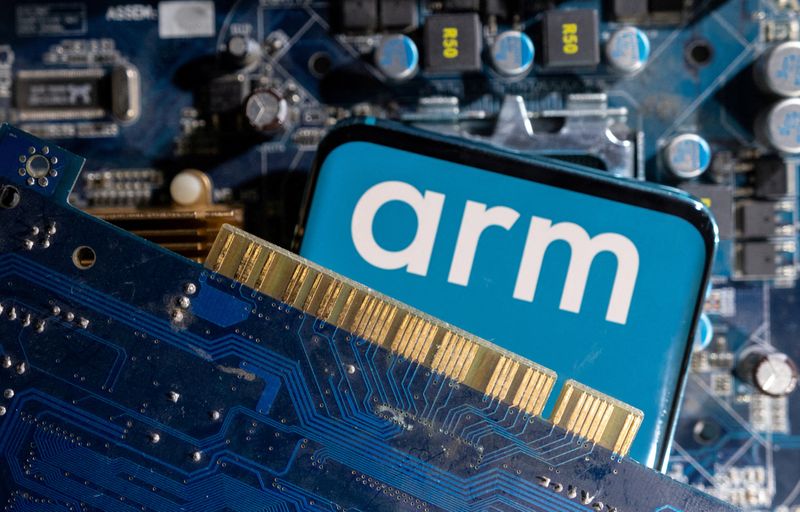By Echo Wang and Anirban Sen
(Reuters) - SoftBank (TYO:9984) Group CEO Masayoshi Son was in San Francisco on Wednesday when he joined a call with his bankers in New York to make a final decision about his company's most valuable asset: chip designer Arm Holdings.
Arm's blockbuster initial public offering (IPO) was oversubscribed by 12 times, and could have been priced at $52 per share, above the indicated range of $47 to $51, people familiar with the matter said.
But the bankers, who had huddled at the offices of SoftBank's financial advisor Raine Group, argued it was better to leave the additional $1 per share - equivalent to about $1 billion in value - on the table. They said doing so could yield a bigger pop when the stock debuts on Nasdaq on Thursday, projecting it could trade between $57 and $62 based on feedback from investors.
Son accepted the banks' recommendation, valuing Arm at $54.5 billion on a fully diluted basis. The bankers' forecasts proved conservative, with Arm's shares ending their first day of trading up 24.7% at $63.59, valuing the company at almost $68 billion on a fully diluted basis.
The behind-the-scenes details on the IPO pricing decision are based on interviews with three people familiar with the discussions. Together with other previously unreported deliberations, they shed new light on why SoftBank took a conservative approach.
SoftBank, which had owned 75% of Arm, agreed to buy the remaining 25% from its $100 billion Vision Fund at a $64 billion valuation last month.
SoftBank was concerned that the Vision Fund remaining an investor would weigh on Arm's shares after the IPO, given that it would be seeking to cash out quickly, the sources said.
At the same time, the deal allowed SoftBank, which has previously explored raising a new private equity fund, the chance to boost the Vision Fund's returns, the sources said. Investors including Saudi Arabia's Public Investment Fund (PIF) and Abu Dhabi's Mubadala were keen to cash out after nursing losses on many of SoftBank's previous bets that soured, the sources said.
Representatives for Arm, SoftBank, PIF, Mubadala and Raine either declined to comment or did not immediately respond to requests for comment.
To stress its long-term commitment to Arm, SoftBank has told investors it will remain a majority owner, and decided against selling more shares beyond the 9.4% stake it was already marketing when the IPO became oversubscribed, the sources said.
SoftBank also told IPO investors the $64 billion valuation "was established by reference to the terms of a prior contractual arrangement" with the Vision Fund and that it should not be seen as an indication of Arm's true value, a regulatory filing showed. It did not provide details on the terms of that agreement.
VISION FUND BOUNCEBACK
The Vision Fund returned to profitability in the latest quarter, thanks to investors' excitement around artificial intelligence boosting the value of some of the startups in which it invested.
Its previous losses, on startups including workspace provider WeWork and ride-sharing firm Didi Global, prevented SoftBank from securing outside investors for Vision Fund 2, Reuters previously reported. That fund's $56 billion in capital came from the Japanese firm and its management, including Son.
The IPO at a $54.5 billion valuation is a win compared to the $40 billion deal to sell Arm to Nvidia Corp (NASDAQ:NVDA), which SoftBank abandoned last year amid opposition from antitrust regulators. SoftBank took Arm private in 2016 for $32 billion.

Arm's business has fared better than the broader chip industry because it licenses designs rather than paying to make processing systems itself. Its technology has become ubiquitous in smartphones and data centers, delivering lucrative royalty payments.
Yet demand for smartphones has weakened, weighing on Arm's earnings. Investors have also scrutinized Arm's exposure to China, given geopolitical tensions with the United States that have led to a race to secure chip supplies.